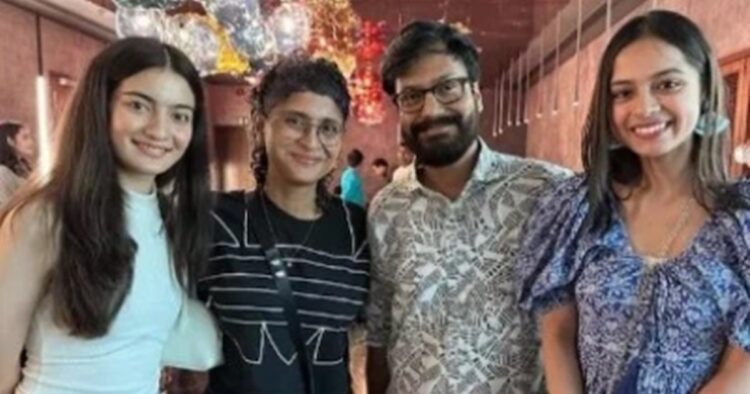Biplab Goswami, hailing from Tripura capital Agartala, has made a mark in the cinematic world by captivating global audiences with his exceptional storytelling prowess. He stands as the driving force behind the success of Laapata Ladies. The film has garnered widespread acclaim on social media, amassing 2.2 million views in its inaugural week on Netflix and securing the fifth spot globally.
Goswami’s journey from the tranquil landscapes of Tripura to the bustling world of Bollywood is profoundly inspiring. Fuelled by a dream to carve his niche in the cinematic universe, he embarked on a path driven by passion and unwavering determination.
Under the direction of Kiran Rao and the production of Aamir Khan, Laapata Ladies has heralded a fresh wave of Bollywood cinema. Goswami, as the screenwriter, has garnered global acclaim for his poignant exploration of the challenges women encounter in Indian society. His narrative elicits laughter, smiles, and empowers viewers to advocate for themselves.
Recalling his journey from Tripura to the silver screen, Goswami reminisced, “Having grown up in Agartala, my aspirations for a career in filmmaking took root early on. Upon completing my foundational education, I harboured dreams of venturing into the world of cinema. This led me to pursue a course in Film Editing at the Satyajit Ray Film & Television Institute, where I honed my technical skills. Subsequently, I delved into the industry, wearing multiple hats as a writer, director, and producer, crafting documentaries, short films, and more. Mumbai became the next destination, where I edited two Hindi movies and started my career.”
Goswami fondly recalled how his work garnered acclaim across diverse film festivals worldwide, spanning countries such as Australia, Austria, Syria, Germany, and Bharat, across numerous categories.
“However,” he continued, “I eventually felt compelled to pivot from film editing to focus on nurturing my creative content for films. Returning to Kolkata from Mumbai, I embarked on crafting a script that would eventually evolve into Laapata Ladies.”
Initially, Goswami envisioned directing the story himself as “at the beginning, the concept deeply resonated with me,” he revealed. “Now, it’s not only a blockbuster in Bharat but also in Bangladesh and multiple other countries. Audiences worldwide are applauding our work, with the film premiering at the Toronto World Film Festival in Canada before being showcased in Indonesia, Australia, the USA, Ireland, and various other esteemed film festivals,” he shared with the publication.
Speaking about the inspiration behind Laapata Ladies, he shared, “The idea originated from my profound observations of gender discrimination, a societal ill that I witnessed since childhood and which became increasingly apparent as I matured. This persistent issue compelled me to address it, especially after encountering stark examples during my studies at SRFTI. One particular memory stands out: a few years ago, in a village, I saw a girl walking alone through the fields, her veil drawn up to her chest despite the absence of anyone nearby. This poignant image served as a stark reminder of the gender disparities prevalent in our society.”
Unlike many projects, Laapata Ladies wasn’t commissioned by any producer or production house. Instead, it stemmed from Goswami’s desire to shed light on the discrimination faced by women in his country and beyond. His travels across various landscapes – cities, villages, and hills – further accentuated the stark differences in opportunities and freedoms between men and women. Despite being less conspicuous in urban areas, these disparities remain deeply entrenched in rural communities. It was this harsh reality that drove him to write Laapata Ladies, a narrative delving into the struggles and resilience of women navigating a world plagued by inequality.
Elucidating on the expansion of the script, Biplab Goswami expressed, “Approximately 10 years ago, I crafted the synopsis and dedicated time to thorough research. Towards the end of 2018, the Cinestaan Script Contest, widely regarded as one of the most significant competitions in Bharat, was announced. This contest welcomed scriptwriters from across the globe to submit entries for Hindi films. Among the 4,000 participants, the top 5 scripts were chosen by a prestigious judging panel including luminaries like Aamir Khan, Rajkumar Hirani, Juhi Chaturvedi, and Anjum Rajabali. To my astonishment, I was selected as the second-best, receiving an award directly from Aamir Khan himself.”
He continued, “Subsequently, Aamir extended an invitation to his house to discuss the script, revealing Kiran’s interest in directing and his own intention to produce it. While this news brought a mix of happiness and sadness, as I had initially envisioned directing it myself, I ultimately embraced the opportunity to collaborate.”
Goswami elaborated, “Following over a year of deliberation, I made the decision to collaborate. It wasn’t an easy process, but eventually, I embraced the opportunity. Thus began a collaborative effort, coinciding with the onset of the Covid pandemic. I was actively involved during the shooting phase, which commenced in Shirdi. Despite the tense atmosphere induced by the pandemic, the journey proved immensely rewarding. Along the way, necessary corrections were made, contributing to the refinement of the project.”
Expressed his admiration for Bollywood’s Perfectionist, Goswami mentioned, “The experience was truly memorable. Aamir Khan’s commitment to meaningful content in Hindi films is truly commendable. Collaborating with him is an achievement in itself. Additionally, Kiran, as the director, brings a remarkable balance to the project. She’s not only a brilliant director but also a wonderful person. Under her skillful direction, the film was brought to life.”
He shared his plans for the future, stating, “This time around, I aim to take on dual roles as both storyteller and director. My focus will be on addressing gender equality issues more extensively. This pervasive issue has persisted in both urban centres and rural areas for years, necessitating a profound re evaluation of societal norms. It’s time to shift our perspective from viewing individuals through the lens of gender to approaching them simply as human beings.”

















Comments